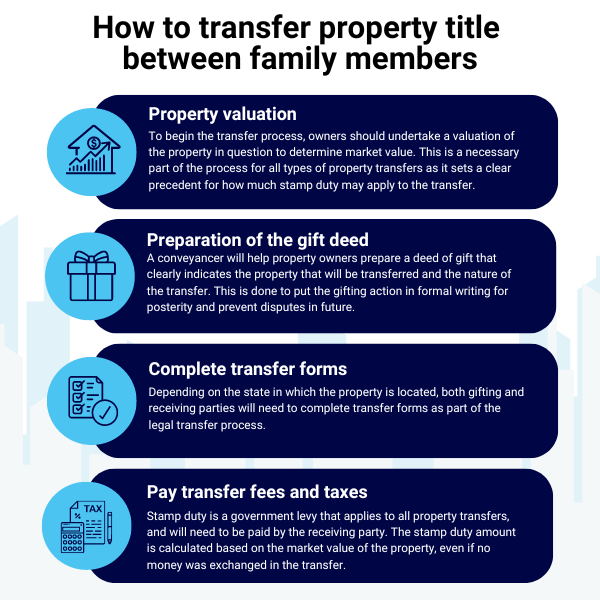The transfer of ownership of property between family members, whether as part of a gifting gesture between parties or a sale transaction, may seem like a straightforward process — after all, it’s much easier to coordinate with a close relative than a stranger.
While not difficult, the process of transferring a property title to a family member involves compliance with strict regulations that ensure a proper legal transfer. For this reason, most transfers are carried out with assistance from a conveyancer to avoid any legal pitfalls or issues during the process.
If you are considering transferring a property title to another family member, understanding what is required in terms of actions, risks, and potential costs (capital gains tax, stamp duty) can help you to minimise the risk of making an unfortunate mistake.
Types of property title transfers between family members
Property titles are often transferred between family members — two of the most common types of transfers fall under gifting and selling.
Parents or other relatives may choose to gift a property to a child or another relative. There may not be an exchange of funds between parties like in a property sale, but transferring a property title to a family member as a gift is still considered a legal transaction under government regulations. Specific paperwork is involved as part of the legal transfer process, and fees may apply based on the nature of the transfer between family members.
Transferring a property title to a family member through a sale follows a similar process to a standard property sale transaction. If the property is sold at a discount to its market value, however, it may be exempt from taxes and transfer fees.
Property title transfers can also occur between family members as a result of special circumstances outside of selling or gifting, such as adding a partner to the ownership of a property, or due to a legal break-up or divorce between partners. These types of transfers have their own set of exemptions from transfer fees.
How to transfer a property title to family members as a gift
Property valuation
To begin the transfer process, owners should undertake a valuation of the property in question to determine market value. This is a necessary part of the process for all types of property transfers as it sets a clear precedent for how much stamp duty may apply to the transfer.
Preparation of the gift deed
A conveyancer will help property owners prepare a deed of gift that clearly indicates the property that will be transferred and the nature of the transfer. This is done to put the gifting action in formal writing for posterity and prevent disputes in future. The gift deed is also submitted to the land registry to initial the legal transfer process.
Complete transfer forms
Depending on the state in which the property is located, both gifting and receiving parties will need to complete transfer forms as part of the legal transfer process. Conveyancers will provide guidance for which forms need to be completed and submitted as part of the state’s conveyancing legislation.
Pay transfer fees and taxes
Stamp duty is a government levy that applies to all property transfers, and will need to be paid by the receiving party. The stamp duty amount is calculated based on the market value of the property, even if no money was exchanged in the transfer. Depending on the nature of the transfer, however, some exemptions and concessions may apply — a conveyancer will typically inform parties of this during the consideration phase.
If an investment property was transferred, the original owner would be subject to capital gains tax, which is a government tax on any investment earnings that the property has made during the term of ownership as an investment property.
How to transfer a property title to family members through a sale
Transferring a property title as part of a sale to a family member is conducted in the same way as a regular property transaction, including the preparation of the contract of sale, signing of the contract, the cooling off period, and the payment of applicable taxes such as stamp duty.
That being said, property sales between family members tend to be more flexible due to a greater level of trust between the parties, allowing for small allowances in the process:
- In regular property sales, the buyer will typically provide a deposit amount of 0.25% of the sale price. In a transaction that involves family members, parties may choose to make a local payment arrangement instead of sticking to this deposit amount.
- Property sold to family members is often offered at a discounted price from the actual market value. If the property is sold at less than its actual market value, the seller may be exempt from paying capital gains tax. However, payable stamp duty will still be calculated based on the market value of the property, not the sale price.
Cost considerations when transferring property between family
The two main costs are capital gains tax and stamp duty, but there are also administration and documentation costs for the land titles office that will apply.
Stamp duty will apply for most gifting and sale property transactions. Transfers that involve adding a de facto or married spouse to a property title, however, will be exempt from stamp duty payment. Stamp duty exemptions may also apply to property title transfers that are necessitated by a divorce or legal break-up.
Capital gains tax is only applicable if the transferred property has been used as an investment asset, with the amount based on the investment earnings during the applicable period.
These are general guidelines that apply to property title transfers between family members, and the actual fees and costs can change based on the nature of the transfer and its surrounding circumstances. It’s important to consult a conveyancer regardless of whether the transfer is a gift, sale, or otherwise, as there are important legal considerations that can affect the transfer process.
At Entry Conveyancing, our conveyancing teams are familiar with the legislation and requirements for property title transfers between family members and can help you achieve a smooth transfer that minimises the risk of costly consequences for you and your family. Contact us to engage our expert conveyancing services in Sydney, Melbourne, and Brisbane.






